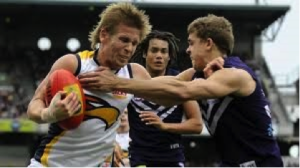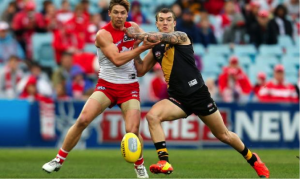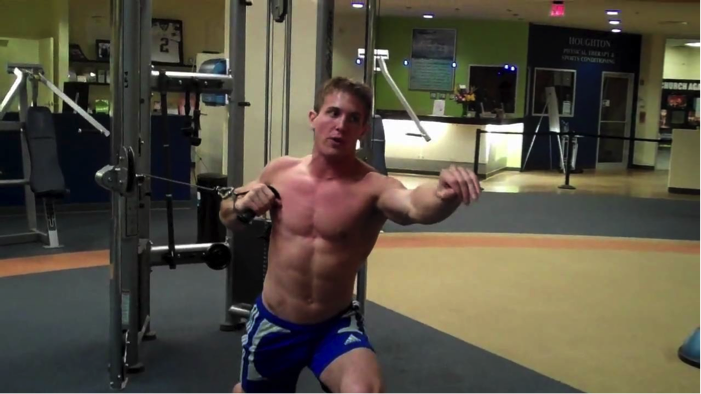The Bench Press & Football
Why the bench press isn’t the be all and end all to upper body strength in footy
The most commonly performed exercise at the gym by just about any male (with an honorable mention to the various forms of bicep curls), the bench press is not surprisingly a staple of every footy players strength training program, regardless of what their age and ability is. And there is absolutely nothing wrong with this – the bench press is the number 1 upper body exercise for developing upper body strength in the pushing pattern, in terms of the absolute load that you are able to lift. However, the limitation with the bench press exercise in terms of its relevance to football, is the fact that simply improving your bench press will not automatically transfer over to a stronger push in a game of footy. This may come as a bit of a surprise, so we will cover the key reasons why.
When thinking of the bench press movement, and considering what abilities we would like this pushing strength to transfer to on game day, we are looking for more strength in;
- Pushing off an opponent in a marking contest (the primary task)
- A single arm fend off, while holding the ball in the other hand
- General body on body pushing/grappling in contests
As tasks requiring the pushing ability similar to the bench press, it is the general assumption that performing bench presses will improve the strength in the associated pushing pattern, and therefore improve strength for these tasks as a result. The reality is that this isn’t entirely the case – a bench press will only provide more potential strength, which could be used for these tasks. In other words, improving your bench press to a heavier weight is great – you can now bench press more, it builds confidence and you will also see some chest and triceps development as a result – but in terms of performance, the ability to bench press heavier is the only thing that has been achieved so far, and the transfer of this pushing power to the above mentioned match situations are dependent on the improvement of other abilities combined with this pushing.
The principle of specificity that we have covered in depth elsewhere will give you a very big clue as to where this discussion is going, and the reasons why. But please stay with us. Look at the pictures of the contested situations below – all involving that body on body pushing motion – the pattern we are looking to develop useable strength in from the bench press. Look closely and thoroughly;
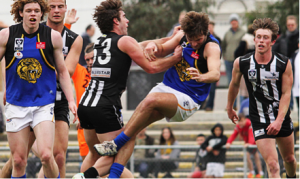
Ok now look at this bench press…….
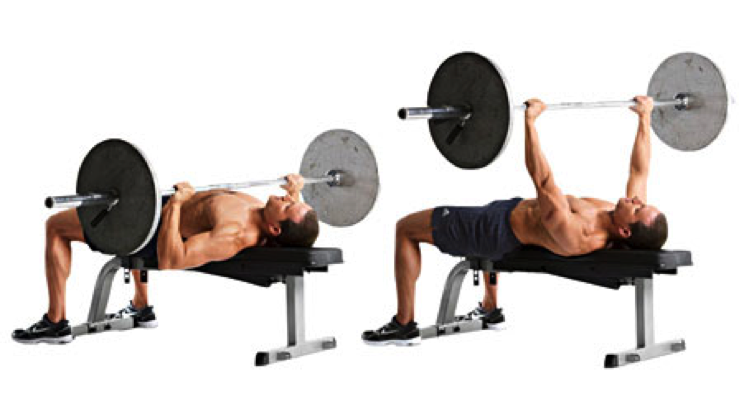 Can you spot any differences? I will list the main ones that apply to footy, and believe me, these differences are VERY IMPORTANT in understanding the key purpose of this article, and what to do about it.
Can you spot any differences? I will list the main ones that apply to footy, and believe me, these differences are VERY IMPORTANT in understanding the key purpose of this article, and what to do about it.
The contests are all standing
This is a HUGE difference in terms of the transferability of strength from the bench press to pushing in a match, and several other points are spin offs from this key difference. For starters, when lying down on the bench, the bench provides all the stability for you – you only need to control the bar. Granted, there is still stability required around the shoulder joint and in controlling the bar, however, in a contest, you rely heavily on both your legs and core strength – as well as the ability to link your legs to your pushing movement via the core effectively. The fact that so much more core work – as well as the integration of the pushing movement with the rest of the body – is required in this standing position in a match than when performing a relatively basic bench press, means that to truly effectively train for situations when you will require this pushing strength in a game, training must also involve pushing movements that are combined with the core and legs, particularly in a standing position. Strength is also very position specific, so having a strong push when lying down does not automatically transfer to having a strong push when standing, just as having a strong core in positions lying on the ground does not automatically transfer to having a strong core in a standing position (another very common fault in conditioning for sports – but a discussion for another day.)
In many instances, the push is performed with only 1 hand
Fending off an opponent is usually performed with 1 hand, and the standard bench press is obviously not performed in this way. The strength in a standard bench press will not transfer to this single armed pushing requirement, as a result of being considerably different movement patterns – from this single sidedness (on top of the fact that we are already standing rather than lying down.) That is not to say that you cant make the bench press single sided though – by doing a dumbbell bench press with 1 dumbbell on 1 side at a time only, and then progressing to an even better scenario and onto the feet – with a single sided cable push (with a slight twist too), which will fully integrate the legs with the single sided pushing movement through the core, and also add a torso rotation movement in for good measure – just as is required in a match situation.
Asymmetric and uneven loading and rotation
This ties in together with the last point – basically saying that the pushing movements involved in games are rarely that standard double arm push, but rather can involve 1 arm at a time and also incorporate a torso rotation element to it – and the bench press certainly doesn’t provide any form of rotational work with the push. Additionally, even when performing a double arm push in a game, you will notice that the loading on each arm is rarely the same. What I mean is, because of the awkward positions you will be in, you will almost never experience both arms doing the same amount of pushing – or ever being at the same range in the push at the same time. The push in a game has a lot less symmetry than a bench press.
The physical challenge of an opponent – even the heaviest bench can’t recreate this
This point combines several others – but basically, an opponent trying to push you off your feet will require far more physical ability from you to control than any bench press could ever train. Balance, leg strength, core strength and the ability to perform these physical requirements from a wide range of directions and variations at the same time are what is asked of you. Furthermore, the challenge will continue to change – your opponent isn’t just an obstacle to be pushed out of the way in a linear fashion like a bench press, but rather will adjust and move and push back from a different angle, requiring your core and legs and torso to continually adjust. The bench press will not train this.
Different directions, rather than just straight out in front
We just touched on this, but the directions you need to push against in a game, aside from often being single sided and standing, also come from a wide range of directions, and directions that are even changing during that particular pushing contest. This is a far cry form the bench press which is purely a simple push straight out in front.
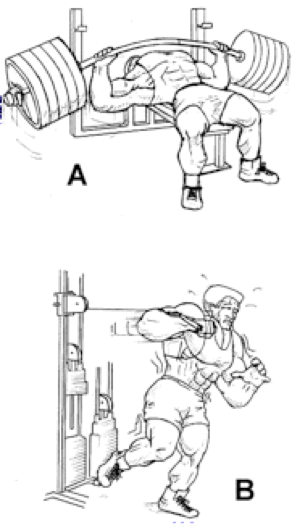
Image taken from Movement that Matters, By Paul Chek: Classically, an athlete that spends all the time it takes to develop a “big bench” will lack integrative training or ability. B) Most of the “big benchers”, or even “little benchers” that train with isolation techniques perform very poorly during the “Standing Single Leg Cable Push Test”.
Don’t underestimate how big these differences are in terms of the transferability of bench press strength. Remember the importance of movements not muscles, as well as motor program compatibility, when focusing on the functionality of an exercise for your particular goal.
So the bench is useless in footy? ABSOLUTELY NOT!
The bench press is a very useful strength training exercise, and should be central to the development of the pushing pattern used in football. The key point we are making here is to not fall into the trap of believing that a bench press is an end in itself in terms of being better at pushing in a game of footy. The exercise is no-where near close enough to the movement situations or physical requirements in game day to transfer directly to a game. Getting a heavier, and even better a more explosive bench press is important in terms of developing the platform of potentially usable functional strength, however it is then important to integrate this bench press strength to more closely related whole body functional pushing movements incorporating both core and legs, for far greater transfer to game day.
Strength Coach

